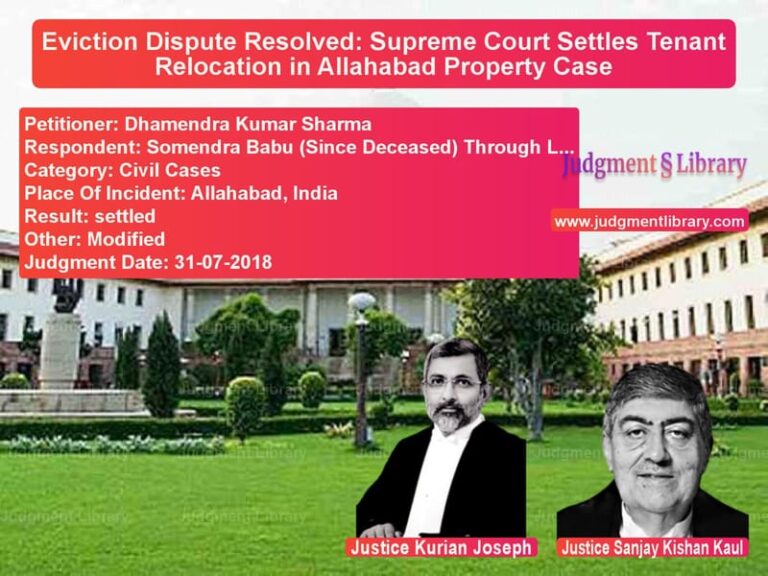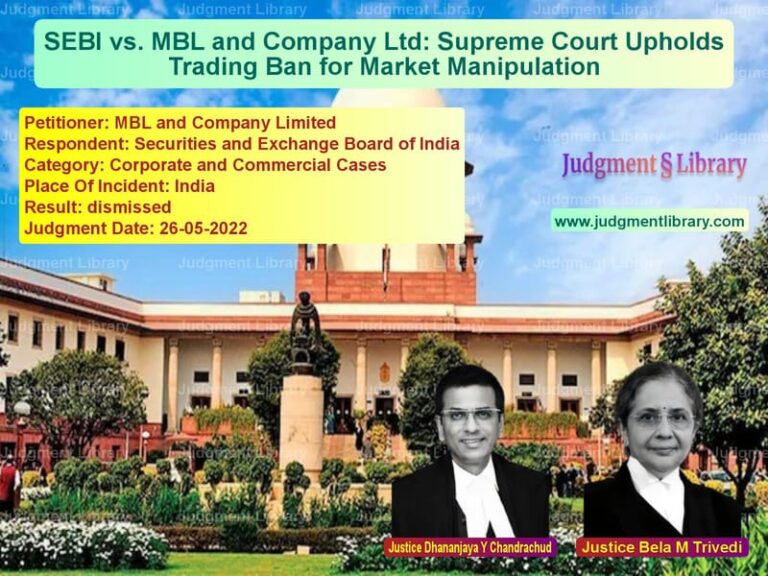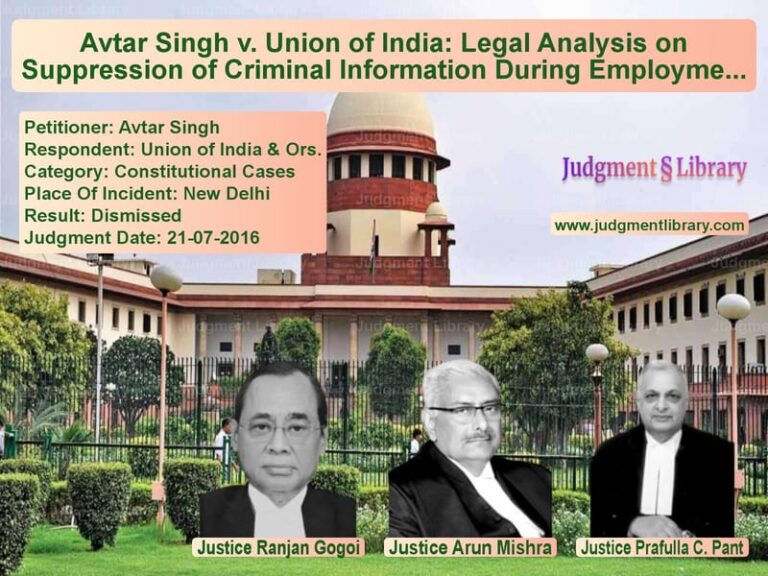House Tax Liability on BOT Projects: Supreme Court’s Verdict on Welspun Projects vs. State Transport
The Supreme Court of India, in the case of M/s Welspun Projects Ltd. vs. Director, State Transport, Punjab & Another, addressed a significant issue regarding the liability of house tax on properties developed under the Build-Operate-Transfer (BOT) model. The Court was tasked with determining whether the appellant, a private entity, was liable to pay house tax on properties leased from the government under a concession agreement.
The case revolved around two bus terminal projects in Jalandhar and Ludhiana, developed by Welspun Projects Ltd. (formerly known as M/s MSK Projects India Ltd.) under a BOT agreement with the Punjab State Transport Department. After the properties were assessed for house tax, the company challenged the liability, arguing that the government retained ownership and should bear the tax burden.
Background of the Case
The dispute originated from two concession agreements signed on 22nd June 2005 between the Government of Punjab and Welspun Projects Ltd. to design, finance, construct, operate, and maintain bus terminals at Jalandhar and Ludhiana. Under the agreements:
- The appellant was granted operational control for a fixed period.
- The company was entitled to levy and collect user fees.
- The properties were leased at a nominal rent of Re. 1 per year.
However, municipal authorities later issued notices demanding house tax payments for the properties. The company disputed the assessment, arguing that as per the lease terms, the government remained the legal owner and should be responsible for the tax.
Key Legal Issues
The Supreme Court examined the following issues:
- Whether Welspun Projects Ltd. qualified as the “owner” under Section 2(35) of the Punjab Municipal Corporation Act, 1976.
- Whether the liability for house tax rested with the government or the appellant under the lease and concession agreements.
- Whether the exemption under Section 157(1) of the Act applied to the appellant.
- Whether the High Court erred in overturning the Punjab Infrastructure Regulatory Authority’s (PIRA) decision favoring the appellant.
Petitioner’s Arguments
The appellant contended:
- It was not the “owner” of the properties but merely an operator under the BOT model.
- The lease agreement explicitly exempted the company from any additional taxes beyond the nominal lease rent of Re. 1 per year.
- The Punjab State Transport Department continued paying house tax even after the agreement, indicating its acceptance of liability.
- The High Court failed to consider the specific exemptions provided under the lease terms.
Respondent’s Arguments
The State Transport Department and municipal authorities argued:
- Since the appellant collected revenue from the properties, it should bear the tax liability.
- The contract allowed the company to recover investments, but it did not exempt it from statutory obligations.
- The exemption clauses in the lease agreement did not override municipal tax laws.
- The High Court correctly interpreted the tax liability provisions.
Supreme Court’s Observations
The Court critically analyzed the agreements and relevant legal provisions before reaching its decision.
1. Definition of “Owner” Under the Act
The Court examined Section 2(35) of the Punjab Municipal Corporation Act, which defines an “owner” as someone entitled to receive rent from a property. The Court noted that while the appellant collected user fees, the government retained ultimate ownership.
2. Lease Terms and Tax Liability
The Court found that Clause 13(e) of the lease agreement explicitly stated:
“That except the lease rental specified in Clause 6 hereof, it shall not levy any fee, rental, tax or any other charge on the Lessee for the lease of the Demised Premises.”
This clause supported the appellant’s argument that it was not responsible for house tax.
3. Exemption Under Section 157(1) of the Act
The Court referred to Section 157(1), which allows the government to exempt certain properties from tax liabilities. It held that the lease agreements effectively granted such an exemption.
4. House Tax Payments by the Transport Department
The Court observed that the government continued paying house tax for several years after the agreement, reinforcing the argument that the liability remained with the state.
Final Judgment
The Supreme Court ruled in favor of Welspun Projects Ltd., holding that:
- The appellant was not liable for house tax on the leased properties.
- The tax demand and payments made by the company were without legal basis.
- The appellant was entitled to a refund of the tax paid, along with 10% interest per annum.
- The High Court’s order was set aside, and the appeals were allowed.
Judgment Outcome: Appeal allowed, tax liability on the state, refund ordered.
Don’t miss out on the full details! Download the complete judgment in PDF format below and gain valuable insights instantly!
Download Judgment: Ms Welspun Projects vs Director, State Tran Supreme Court of India Judgment Dated 08-11-2016.pdf
Direct Downlaod Judgment: Direct downlaod this Judgment
See all petitions in Tax Refund Disputes
See all petitions in Banking Regulations
See all petitions in Corporate Compliance
See all petitions in Judgment by Anil R. Dave
See all petitions in Judgment by R K Agrawal
See all petitions in Judgment by L. Nageswara Rao
See all petitions in allowed
See all petitions in supreme court of India judgments November 2016
See all petitions in 2016 judgments
See all posts in Taxation and Financial Cases Category
See all allowed petitions in Taxation and Financial Cases Category
See all Dismissed petitions in Taxation and Financial Cases Category
See all partially allowed petitions in Taxation and Financial Cases Category







